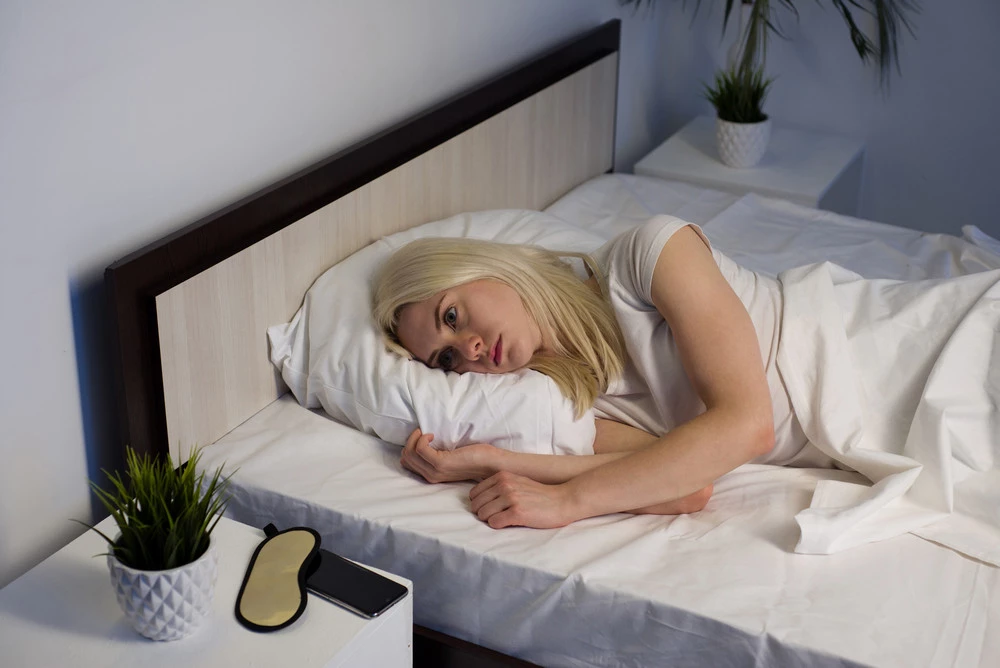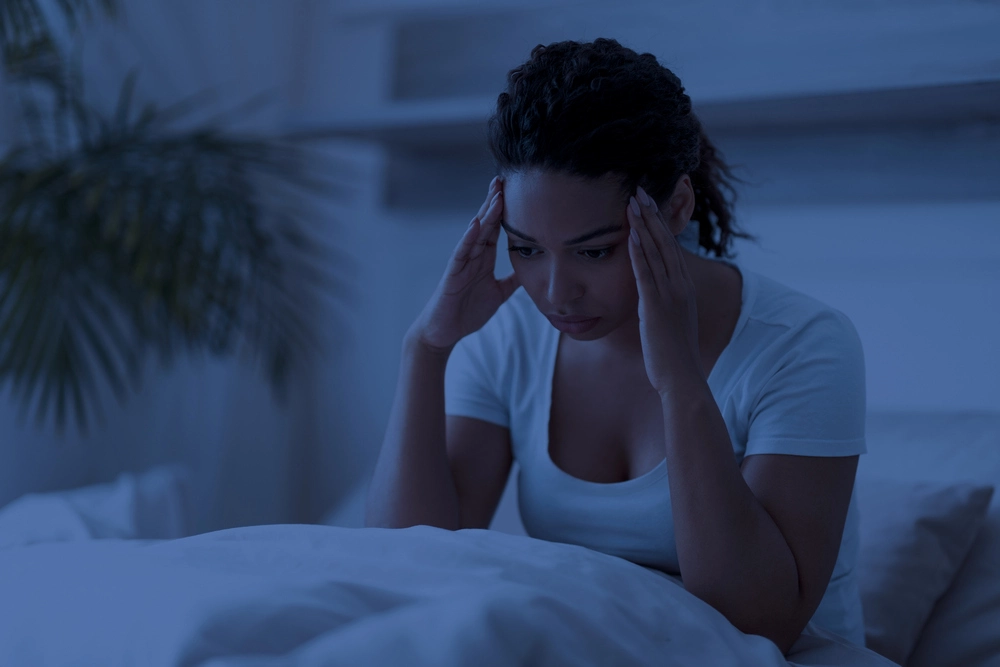Announcement
This article will provide comprehensive insights into postpartum insomnia, empowering new mothers with knowledge about its causes, symptoms, and effective treatments while emphasizing the importance of addressing this common yet often overlooked condition.
Introduction
For those who struggled with insomnia during pregnancy, not being able to sleep after giving birth might not seem like a big deal. However, several nights without sleep in a row can cause significant physical and mental health disturbances, which is why it’s important to understand whether or not you are dealing with postpartum insomnia.
Postpartum sleep issues are very important to recognize early and to treat properly. There are several causes of postpartum insomnia, and symptoms can often go overlooked because they are incorrectly attributed to things like childbirth or stress from child-rearing. Mothers must address sleep issues after childbirth so that they can provide for their newborns in the best way and take care of themselves.
This article will cover what postpartum insomnia is and how it’s different from regular insomnia, different causes of postpartum insomnia, postpartum insomnia symptoms, how long symptoms last, and what type of treatment is available.

Understanding postpartum insomnia
Understanding postpartum insomnia can help you find the right treatment at the right time.
What is insomnia?
Insomnia is one of the most common sleep disorders, and it is characterized by symptoms such as:
- An inability to fall asleep
- An inability to stay asleep
- Waking up feeling unrested
- Waking up too early despite needing sleep
This leads to subsequent issues during the day:
- Daytime fatigue
- Problems with concentration
- Mood changes
- Daytime sleepiness
- Anxiety oversleep
An official diagnosis of insomnia comes when you’ve had at least three nights each week where your symptoms manifest for more than three months at a time. If symptoms have continued for less than 3 months, it’s considered short-term insomnia, but chronic insomnia if it goes beyond 3 months in a row.
Roughly 30% of adults experience insomnia symptoms and 10% struggle with an insomnia disorder.
What is postpartum insomnia?
Postpartum insomnia is the same category of sleep disorder but one that is a result of pregnancy or childbirth. It happens directly after childbirth during the postpartum period and can continue for several weeks or years if left untreated.
Postpartum insomnia symptoms
Postpartum insomnia comes with similar symptoms but affects women after giving birth.
For example:
- Women experiencing postpartum depression will often find it difficult to fall asleep. This can manifest as getting into bed when extremely tired, but then, as soon as you close your eyes, your brain won’t shut off, and you can’t fall asleep. In many cases, this can lead to staying in bed for several hours before you finally fall asleep, and that impacts how long you’re able to sleep and the likelihood of sleeping in or taking naps during the day.
- In other instances, you might experience an inability to stay asleep. This can look like going to bed and falling asleep immediately but then waking up within a few hours and finding it difficult to go back to sleep once you are awake.
- Other common postpartum insomnia symptoms include waking up too early. In these cases, you might go to bed at the same time, fall asleep immediately, and not wake up every couple of hours. However, you will likely wake up several hours before you need to, no matter how exhausted you feel, and be unable to go back to sleep.
- It’s not uncommon to wake up feeling like you didn’t get any sleep at all.
Postpartum insomnia can be highly disruptive to daily life, something that is critical when dealing with a newborn. Similarly, it can have a significant detrimental effect on your overall physical and mental health. Without postpartum insomnia treatment, your condition is likely to worsen or lead to tangential mental and physical health problems.
Women are disproportionately impacted by insomnia compared to men, with 12.8% of women experiencing insomnia but only 9.7% of men.
These figures are worsened when you consider the increased risk of postpartum insomnia.
Postpartum insomnia causes
Women are particularly vulnerable to insomnia during the reproductive transition, including the postpartum period. Pregnant women with insomnia are more likely to experience complications like:
- Preterm birth
- Gestational hypertension
- Maternal psychiatric conditions
Postpartum insomnia can also lead to increased risks of:
- Depression
- Postpartum insomnia and anxiety
Why are women at a higher risk in this period?
Several psychosocial and physiological changes take place during the postpartum period, which can contribute to the development or sustainment of postpartum insomnia symptoms.
Precipitating causes
There are several precipitating events, things that happen before the postpartum time frame, which can increase the risk of postpartum insomnia development. These refer to biopsychosocial characteristics that increase the risk of developing postpartum depression.
Insomnia happens when things like your nervous system are hyper-aroused, or your cognition is overly activated. pregnant women typically experience increased cognitive hyperarousal, and that can lead to things like repetitive negative thoughts at night.
It can also lead to interactions with hormonal changes that increase the likelihood of anxiety, stress, hyperarousal, and insomnia. Depression and suicidal ideation can increase sleep deficiency because of hyperarousal.
This starts with pregnancy itself, causing a hormonal change that can alter sleeping patterns. During this time frame, women are more susceptible to depression and anxiety as a result of similar hormonal changes and sleep disturbances, both of which can heighten the risk of postpartum insomnia and anxiety or depression.
Physical discomfort and caregiving demands can also increase the risk.
Pregnancy and childbirth
Pregnancy and childbirth can both be precipitating events that increase the risk of developing postpartum depression. Acute insomnia is often related to stress from major events in your life, as well as physical changes or health problems. Pregnancy and childbirth are often accompanied by all of these, so it’s not uncommon for women who are pregnant or dealing with child rearing to struggle with sleep fragmentation.
Hormonal changes like the drop in estrogen after childbirth can change the circadian system, leading to an increased risk of postpartum insomnia.
While a major event, childbirth also increases stress reactivity and can cause maladaptive regulation strategies between cognition and emotion, making women more vulnerable to insomnia especially because they are up at night often hyper-aroused and stressed.
There are other more practical causes, such as the sleep schedule of your newborn. A newborn’s change in their sleep cycle can disrupt a mother’s sleep cycle and lead to insomnia, especially with things like reverse cycling when a baby is awake during the day but asleep at night.
Mothers with multiple children in the house might experience symptoms caused by the need to not only care for a child who wakes up throughout the night in need of feeding and other care but to continue providing for older children by way of getting up and helping them get ready for school, making the meals, or taking them to and from school activities.

Mental health conditions
Other causes of postpartum insomnia symptoms relate to mental health disorders. Individuals who struggle with a history of depression or anxiety are more likely to develop postpartum insomnia.
Postpartum depression
Some of the most common complications associated with pregnancy include postpartum depression, which affects up to 19% of women. Research has focused heavily on the relationship between postpartum depression and postpartum insomnia, finding a significant overlap between the two.
A history of depression can affect the relationship between depression and postpartum insomnia symptoms.
This means that there is an intricate and intertwined relationship such that women with postpartum insomnia are more likely to develop depression, just the same as those with postpartum depression are more likely to struggle with postpartum insomnia as one of their major symptoms.
Longitudinal studies have found that postpartum insomnia is often a predictor of postpartum depression symptoms.
As such, some causes of postpartum depression can be postpartum insomnia, which means it’s particularly important to get treatment for any insomnia symptoms you have to help reduce the risk of developing postpartum depression, especially in women who have a history of depression.
Postpartum Anxiety
Postpartum anxiety, while very common, does have a relationship with insomnia. Several studies have found that women who experience postpartum insomnia symptoms are more likely to experience anxiety immediately after giving birth.
Postpartum insomnia and anxiety, much like depression, exacerbate one another whereby a mother with insomnia after birth is more likely to struggle with higher anxiety levels, and those anxiety levels are more likely to lead to increased postpartum insomnia symptoms, especially if the anxiety revolves around insomnia.
Postpartum sleep changes
When caring for an infant, new parents start to exhibit sleep behaviors that are very different from what they were before. There is a transition from long-term sleep to short, acute sleep sessions and a lot of nighttime feedings and diaper changes. Postpartum changes to sleep patterns can include:
- Spending long hours in bed, awake, with a sleeping child
- Sleeping later in the day
- Taking frequent naps
- Not getting 8 hours in a row
Behaviors like sleeping in or taking frequent naps can help compensate for the sleep fragmentation that accompanies having to get up several times in the middle of the night to feed or care for a new child. However, these characteristics also perpetuate insomnia symptoms and can turn acute cases of postpartum insomnia into chronic cases.
How long does postpartum insomnia last?
Depending on when you get treatment for postpartum insomnia and what your postpartum insomnia symptoms are, including the severity and frequency of nights without sleep, the length of time can range anywhere from a few weeks to several years.
Several studies have found that eight weeks after giving birth, 60% of women experienced postpartum insomnia, and two years after birth, 41% continued to experience postpartum insomnia.
You can expect improvement in your postpartum insomnia symptoms once you get the right type of treatment. But how long does postpartum insomnia last without treatment? Studies have found that insomnia can remain persistent for up to 2 years after childbirth without any postpartum insomnia treatment, but severe or prolonged cases can have lasting impacts and should be treated long before symptoms resolve on their own.
Treating postpartum insomnia
Treating postpartum insomnia starts with getting a proper evaluation by your ob-gyn. Treatment is something that looks different for everyone depending on the causes and other symptoms, which is why it’s important to involve your medical team in your postpartum insomnia treatment.

Non-medical treatments and lifestyle adjustments
Learning how to treat postpartum anxiety is very important for anyone experiencing symptoms.
CBT
The most common treatment for postpartum insomnia starts with cognitive behavioral therapy.
Cognitive behavioral therapy for insomnia is often less intense than cognitive behavioral therapy for other mental health conditions and only lasts a fraction of the sessions, between four and six sessions, as opposed to the 12 sessions associated with treatment for other conditions.
Numerous studies have confirmed that the efficacy of cognitive behavioral therapy is high, with up to 80% of women seeing their symptoms go away.
With cognitive behavioral therapy, women can enjoy reduced symptoms during pregnancy and the postpartum period.
Normally, face-to-face sessions produce the highest results. However, women can also find online services that offer similar services at home, perfect for accommodating erratic schedules. During these sessions you’ll learn:
- How to identify individual causes of postpartum insomnia
- How to use stress management
- How to develop personalized coping or relaxation skills
Lifestyle changes
Lifestyle changes can also help. This begins with good sleep hygiene. Sleep hygiene refers to the steps you take to encourage healthy sleep patterns, such as:
- Going to bed at the same time each night
- Trying to get 7-9 hours per night (even if you get up to deal with the baby in between)
- Avoiding sugar or caffeine right before bed
- Avoiding screen time for one hour before bed
- Keeping your room free from distractions, like screens or phone alerts
- Avoid noises as you sleep
- Keeping your room dark
If you are in bed for a significant amount of time and notice that your symptoms have stopped you from falling asleep or have woken you up and prevented you from going back to sleep, it’s important to get out of bed and go somewhere else. You want your brain to recognize that your bed is specifically intended for sleeping, not for frustration or stress because of anxiety and insomnia.
You might find that for the first several weeks, you end up getting the latter half of your sleep in another room, like on the couch, in the baby’s room, or a spare room, but that can help you avoid associating the anxiety and insomnia symptoms with your bedroom.
Medical treatment options
Some medications might prove useful in conjunction with lifestyle changes and holistic practices. Certain over-the-counter supplements, like melatonin, can help you promote falling asleep faster. The body naturally produces melatonin, but with insomnia, one of the main symptoms can be difficulty falling asleep. Melatonin supplements come in several forms, like gummies or tablets, and you can follow the instructions for how many of each to take right before you go to bed.
Practical tips for managing postpartum insomnia
Several studies have focused on protective factors that can be used as a treatment for postpartum insomnia. The two main factors for managing postpartum insomnia symptoms include:
- Physical activity
- Mindfulness
Physical activity is directly correlated to a reduced risk of developing postpartum insomnia in the first place because it can reduce other predictors of insomnia symptoms. Moreover, physical activity and mindfulness overlap in their ability to provide a stopping point for any rumination or anxiety about potential insomnia, which prevents postpartum mothers from overthinking their risk of developing insomnia and, by extension, leading to insomnia.
Mindfulness focuses on being aware of all emotions, good and bad. This type of wholeness avoids pushing away negative emotions like anxiety or stress. Rather, it helps individuals to practice non-judgment, to simply be aware of what they are experiencing in the present moment with compassion and not try to change it or push it away.
Rumination and anxiety cannot coexist with mindfulness. This means that when women wake up throughout the night to care for a newborn, they are more likely to ruminate or worry about stress, childbirth, and childcare, all of which create higher symptoms of depression and insomnia. However, practicing mindfulness during the day has been shown to directly lower symptoms of both, especially at night.

Summing up
Overall, several studies have reviewed the links between postpartum insomnia and anxiety, stress, hormonal changes, and other symptoms. Knowing how to treat postpartum insomnia is important to supporting your mental health and physical health. As a parent, it can be difficult to prioritize yourself when there is a child completely dependent on you, but it’s more important to address postpartum insomnia symptoms early so that you are in a position to provide optimal care.
Postpartum insomnia has many causes, most of which relate to hormonal changes, stress, and physical changes involved in pregnancy and childbirth, as well as hyperarousal at night. No matter your causes, it’s important to seek professional help as soon as you start to struggle and prioritize your sleep health before things get worse. Insomnia can last several years without treatment, and it’s well worth it for you to invest in better mental and physical health now rather than wait several years for symptoms to resolve on their own.
FAQ
- How long can postpartum insomnia last?
Postpartum insomnia can last different lengths of time for different people. Everyone experiences unique symptoms based on circumstances and environment.
Without the right treatment, however, even acute symptoms are more likely to become chronic symptoms. Chronic insomnia persists for at least three months or more, and several studies confirm that without treatment, it can take a few years for your symptoms to resolve naturally after your new child’s sleep schedule stabilizes or your hormone levels go back to normal.
- Does postpartum insomnia go away?
Postpartum insomnia can go away on its own, especially in acute situations. Even chronic insomnia can go away once the factors that caused the insomnia are dealt with. In some cases, that can mean changes to a baby’s sleep pattern, allowing new moms to get enough sleep. In other cases, it can mean hormone levels going back to their pre-pregnancy levels.
However, if it continues for more than three months, it’s best to seek postpartum insomnia treatment rather than wait for symptoms to fix themselves.
- Is insomnia three months postpartum a sign of postpartum depression?
Insomnia 3 months into postpartum is not an automatic sign of postpartum depression, but there is a significant relationship between postpartum depression and postpartum insomnia. For those who experience untreated postpartum insomnia, it is more likely that they will also develop postpartum depression, which is why it’s important to get help for sleep problems as soon as they manifest.
- What causes postpartum insomnia?
Several factors can cause postpartum insomnia, including changes to hormone levels, anxiety, depression, environment, stress, and everything else associated with pregnancy and childbirth.
- When should a mother seek professional help for insomnia 6 months postpartum?
A mother should seek professional help for insomnia if they’ve had it for more than six months. Sleep is essential to your overall health and the function of your body. Without proper treatment, you can experience severe physical and mental health problems that will exacerbate insomnia symptoms and make it difficult to care for yourself or your child.